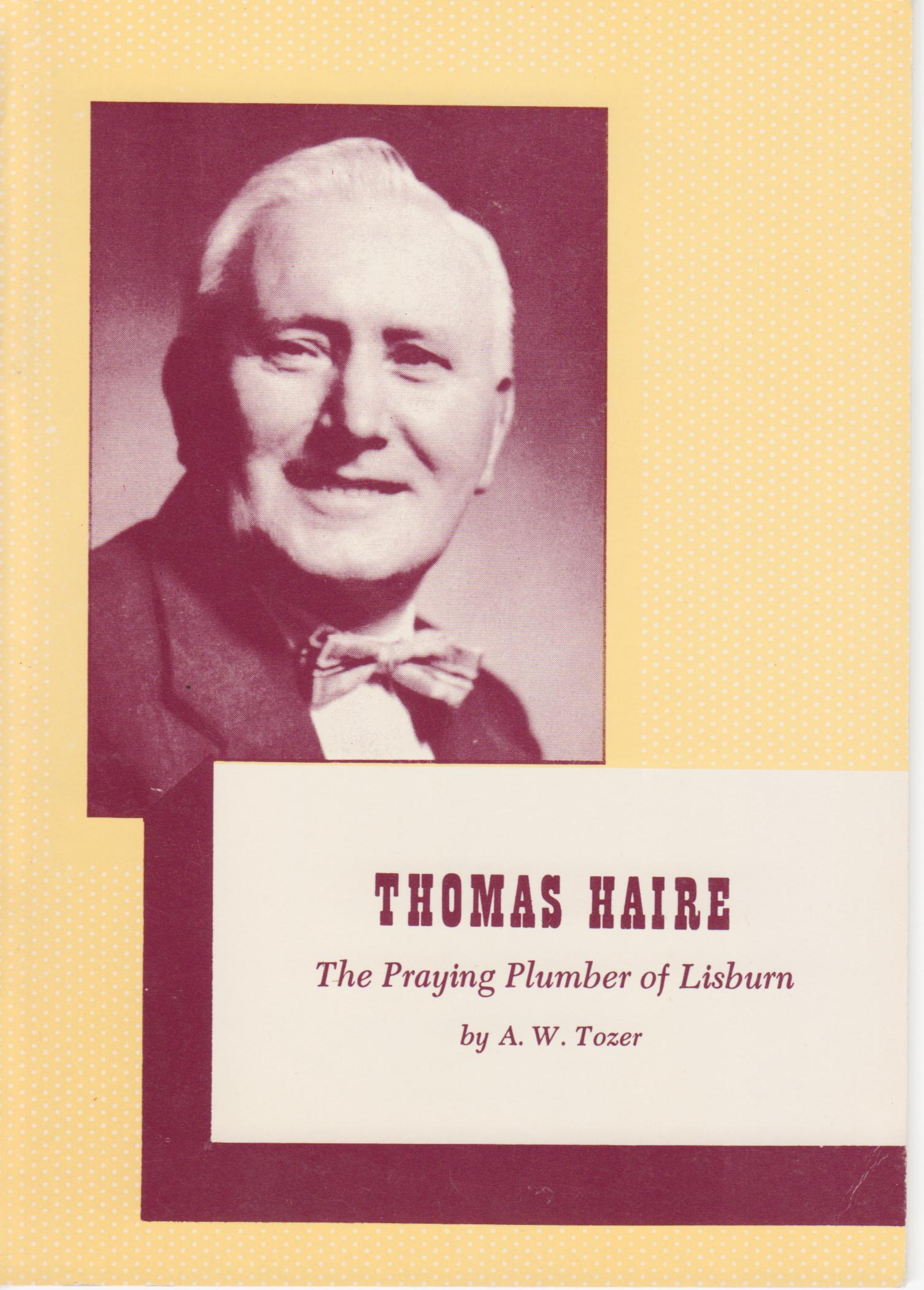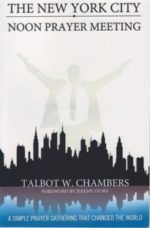Thomas Haire
The Praying Plumber of Lisburn
A Sketch of God’s Dealings with Thomas Haire, by A. W. Tozer
This sketch brings together two men who in most ways are very different, but who in their affinity for things spiritual are very much alike. To Tozer, the two characteristics that marked Haire as unusual was his utter devotion to prayer and his amazing spiritual penetration. A Bible college president described praying with Haire as listening to a man converse with God who knew from the Spirit’s tutoring the concerns of the Father’s heart and the vocabulary of the heavenlies.
By Dr. S. A. Witmer, President, Fort Wayne Bible College
By a remarkable providence this sketch of Tom Haire by A. W. Tozer brings together two men who in most ways are very much different but who in their affinity for things spiritual are very much alike. Accordingly, they have another characteristic in common: both are nonconformists, each fashioned by divine processes according to an individual pattern.
The significance of God-made men in the twentieth-century West can best be appreciated against the backdrop of our times. In this age of mass production and mass media of communication, when the stress in school and church, at least in America, is on social adjustment, the inevitable result is mediocre conformity. The product is a religious robot instead of a saint. “This world is not a friend to grace” takes on added meaning in our day, and it helps to explain why there are so few saintly Christians.
The orders of the Catholic Church have for centuries tried to produce saints by imposing a right regimentation of thought and conduct on the human spirit.
(more)
The Secret of Successful Praying, by Tom Haire
As never before I feel the great need for intense research into the deeper mysteries of prayer.
I see on the distant horizon truth which, if I can attain to through grace, should to some degree shake hell and retard its outpourings into the world and the Church in our day. This truth lies mainly in John 17 (verses 21-23): “That they all may be one; as thou, Father, art in me, and I in thee, that they also may be one in us: that the world may believe that thou hast sent me. And the glory which thou gavest me I have given them; that they may be one, even as we are one: I in them, and thou in me, that they may be made perfect in one; and that the world may know that thou hast sent me, and hast loved them, as thou hast loved me.”
The purpose that lies in this passage, as I see it, is that the world may come to believe in Christ. The condition is that we believers grow more perfectly into harmony with and correspondence to the Deity. This is a restoration to that state enjoyed by our first parents before the Fall. It is described by the words, “So God created man in his own image, in the image of God created he him.” In the next sentence God said, “Have dominion.” Those who are in the divine image have divine authorization to subdue the earth. The means by which this authority is exercised is prayer.
The first Adam failed. He was but a creature of God. The new creation which is brought into being through the world of Christ in atonement is born of God and receives His true nature, so that the fullness of the Godhead indwells the human personality. This is a distinct advance over the position enjoyed by the first Adam. The human personality becomes the outward instrument of the Almighty Inworker. If this becomes true in actual experience, then the “subduing” and the “dominion” should be made factual in the earth wherever our prayer rights are exercised in faith.
That a Spirit-led Christian can actually do the very work of Christ is plainly taught in the Scriptures. Paul said, “To me to live is Christ.” John said, “As he is, so are we in this world.” And I think we have hardly yet dared to face the mighty implications in the words of our Lord in John 14: “Verily, verily, I say unto you, he that believeth on me, the works that I do shall he do also; and greater works than these shall he do; because I go unto my Father” (verse 12).
Sometimes I imagine I am a bottle filled to the utmost; then I think I am that bottle in the middle of the waters before the firmament was created or the dry land appeared, with infinite miles of grace beneath me and around me in all directions. The little bottle doubts sometimes through the suggestions of the serpent. Will there be enough water to keep it filled and to float it safely forever? But the doubts are only for a moment. Thank God there is always enough in Christ!
As in the Garden there was a serpent, so now there are serpents to tempt God’s redeemed people. Only now the dark serpents have been joined by white ones. The dark ones are on Skid Row and are terrible because of their frightful physical manifestations such as drinking, dope addiction and other such gross sins. The white ones are of the same nature as the others, but are illuminated by “the angel of light” who transforms them into white ones with supernatural power to work in human personalities. These may lead people to speak with the tongues of angels, foretell the future, understand all mysteries and be driven with a passionate desire for the attainment of all knowledge.
Our colleges, sad to think, are alive with white serpents, moving men to seek honor among men, such honor as superior learning brings. It is difficult to get prayer into its primary place in our colleges, even in our Christian colleges. The head, the voice, the dress, the gestures – these take first place and are eagerly cultivated. But we can never cast out devils with the intellect, however cultured. Even casting out devils may be counterfeited by the devil, who will withdraw his power for a moment to deceive the unwary. Casting out devils, speaking wonderful words or moving mountains may be no evidence at all of true Christianity. “Many will say to me in that day, Lord, Lord, have we not prophesied in thy name? and in thy name have cast out devils? and in thy name done many wonderful works? And then will I profess unto them, I never knew you: depart from me, ye that work iniquity” (Matt. 7:22-23).
Martyrdom without love will prove to be a snare. Giving my body to be burned or starving it by fasting is in direct violation of the command of God in creation. “Give ye them to eat” is in harmony with the purpose of God, for He made many things to be used for food for mankind. True fasting is the result of spiritual preoccupation, as when Moses went into the Mount and continued without food for forty days. He did not need food then, for he was seeing God’s face. The sins of Aaron and the people of Israel lay heavily on his heart and crowded out the desire for food. He spent his days in intercession. I think he saw by faith the Lamb slain before the foundation of the world, and as he moved into spiritual union with the Lamb he was enabled to intercede successfully for Israel. God answered with the most wonderful words ever spoken to man: “I have pardoned according to thy word.” Moses was offered the opportunity to become greater than the sinning multitude, but in declining this offer and identifying himself with Israel he came into spiritual harmony with the Lamb who was later to give His life for His sinning friends. Is this what Paul meant when he expressed a desire to be “made conformable” unto His death?
Fasting and faith are to be secondary always. Perhaps I should say, conscious faith and purposive fasting. We are commanded to “have the faith of God.” This is a result of a loving understanding of the mind of God and comes as He sits beside the refining vessel and skims off the dross from our natures. Then we see His face and understand the purpose behind the refining fire and believe Him without effort. God thus gives the gift of affinity. It is a kind of spiritual birth within us and is accompanied by love. God is love and without love everything else is vain.
It is impossible to overemphasize the importance of love in the Christian life. Though I have all faith and have not love I am as salt that has lost its savor. Love cannot sin, for God is love and God can never sin. Love is a fire that consumes sin. The Church clamors for mountain-removing faith and meritorious praying and fasting, but if all this is secretly to be used to attain fame among the saints then it is inspired by the white serpent. Christ prayed all night because He was drawn irresistibly to it as by a magnet within Him. It was the result of an irresistible urge rather than of conscious purpose. He that saith he abideth in Him ought to walk even as He walked – and prayed. The same motives that governed Him should govern us.
The secret power of prayer is affinity with Christ and conformity to His image. The urge to pray must come from God and not from our own ambition. Increasing measure of Christ-likeness will mean increased power in prayer. Then when He shall appear, we shall be like Him, for we shall see Him as He is.



